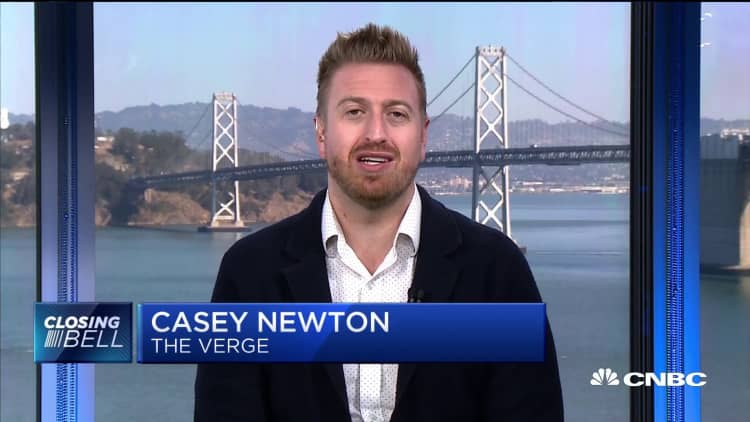Facebook announced a slate of changes Wednesday to help advertisers control the kind of content their ads show up on.
Facebook announced a test for advertisers that lets them white-list certain publishers for some of their placements. The platform is also testing the ability for advertisers to white-list the type of content they appear on for in-stream video ads. To do this, Facebook is working with companies that help advertisers with digital brand safety, including Integral Ad Science, OpenSlate and Zefr. Facebook said it hopes to more broadly roll out those tools next year.
Going forward, advertisers will also be able to manage inventory filters and block lists for entire accounts, instead of having to apply to one campaign at a time, which Facebook said was a request made by advertisers. These changes, among other new capabilities, add on to other existing controls for brand safety.
The changes come as Facebook is in the middle of major debate over its political ads policy, which allows lies and misinformation and lets advertisers target those messages. The controversy has again put the company under a microscope about the kind of ecosystem it's creating.
But amid consumer and regulatory concern, brands are still spending. And tools that help brands scale up their placements on Facebook while maintaining a level of control over the content or tenor of videos they appear on might make it a less risky bet for advertisers, who despite also having concerns over the content on major tech platforms have not meaningfully shifted spend away.
In the realm of digital advertising, Facebook and Google are considered to have a reigning "duopoly" over ad spend. But that dominance is not without challenge: eMarketer predicted earlier this year that Google and Facebook's cumulative market share in the U.S. would drop in 2019. Snap, Pinterest and Amazon's ad businesses grew faster than the industry giants in the third quarter.
Meanwhile, TV ad spending is expected to drop nearly 3% this year to $70.3 billion — marking the first time U.S. ad spend has fallen below 30% of total U.S. ad spend, according to an eMarketer report from last week. And TV does argue it offers a level of safety for brands that's more complicated to achieve across the expanse of online video.
Brands differ in their level of sensitivity over where they appear. While some might want to make sure they're not on videos with adult language, others might have added concerns, like a fast food company perhaps not wanting to appear on a video about obesity.
"Not every advertiser cares about this as much as others. I don't want to paint a picture that all 7 million advertisers are focused on this," Facebook's vice president of global marketing solutions Carolyn Everson told CNBC in an interview Tuesday. "Some do not utilize these tools at all. They are much more focused on performance and price, and they want their ads to appear in as many places as possible … and we have the other extreme, where advertisers are extremely brand sensitive."
Integral Ad Science, one of Facebook's partners, will let advertisers create a list of videos that are low-risk across categories like adult videos, hate speech, violence and illegal drugs, the company said. Brands use this offering to apply what IAS calls a "pre-screened" list through Facebook.
OpenSlate's CEO Mike Henry said in a statement it will let advertisers have more than 20 video-level "suitability filters," while Zefr said it will make sure even if a page or channel is generally safe a video won't appear on a whitelist if it's holistically about brand unsafe topics, like violence, sex or drugs and alcohol. Zefr's co-CEO Rich Raddon said in a statement that brands have been looking for "scaled and safe" ways to find video reach, and that this gives them nuance in content preferences without sacrificing scale or safety.
Facebook certainly gives advertisers massive scale and precision in terms of targeting, but the nature of the digital ecosystem can make it more difficult to ensure that ads end up only on the kind of content a brand would want to be associated with. Though moves to make it more of a controlled environment might help brands think about Facebook on more of an even field as TV, Everson said this isn't a ploy to be safer than television advertising.
"Are we trying to make Facebook safer than TV? That's not the way we talk about it, certainly with advertisers," she said. "You know our numbers, our scale. People are on our platform. They're spending a significant amount of time. Marketers want to be where people are. And we want to create an environment where marketers are as safe as possible in that environment."
As part of Facebook's brand safety announcements, the company said it has 35,000 people working on safety and security, including the removal billions of fake accounts a year, and is investing in technology to reduce the spread of fake news and to identify content that violates its policies.
Everson said this also means cracking down on misleading ads that promise, for instance, speedy shipping when a consumer doesn't end up getting the product for months.
"We're on a journey to make the ecosystem as safe and secure as possible," she said. "The long term goal is to have an incredibly robust ecosystem where businesses can sell their products, consumers have the confidence to buy them and know what they're getting, and so that's the long-range plan and these are just a series of steps along that path. It's a lot that we're doing to get there."



